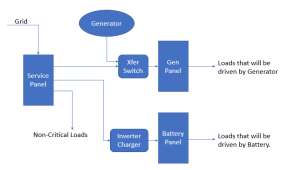New to the forum, thanks in advance for the help. I just went through hurricane Ida, which ripped one of my load center boxes off the brick wall, so I have electrical work in my future.
Planning to install a whole house generator and some solar. I just watched one of Will's video's on sizing; it looks like I would need a very large battery bank for my loads. So instead, I'm looking to do a hybrid of grid-connected (not sure that's the right terminology), whole house generator, and PV/battery/inverter.
The large loads are: 5 ton a/c condensing unit, 3 ton a/c condensing unit, two hot water heaters with two heating elements each (each element is 4kw, I think), blower motors in the two air handlers (1/2 hp or larger), and 1 kw microwave. The rest of the house is probably trivial; most lighting is LED, ceiling fans are fractional hp, and computers/tv's are under 500 watts each.
The idea would be to run the grid or generator when big loads are needed, but use the solar system for everything else. Is this direction-ally correct, or should I be re-thinking it? Would the batteries be really huge and expensive (over $2000), or did I miss something?
Planning to install a whole house generator and some solar. I just watched one of Will's video's on sizing; it looks like I would need a very large battery bank for my loads. So instead, I'm looking to do a hybrid of grid-connected (not sure that's the right terminology), whole house generator, and PV/battery/inverter.
The large loads are: 5 ton a/c condensing unit, 3 ton a/c condensing unit, two hot water heaters with two heating elements each (each element is 4kw, I think), blower motors in the two air handlers (1/2 hp or larger), and 1 kw microwave. The rest of the house is probably trivial; most lighting is LED, ceiling fans are fractional hp, and computers/tv's are under 500 watts each.
The idea would be to run the grid or generator when big loads are needed, but use the solar system for everything else. Is this direction-ally correct, or should I be re-thinking it? Would the batteries be really huge and expensive (over $2000), or did I miss something?




